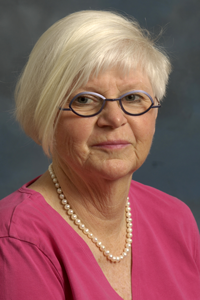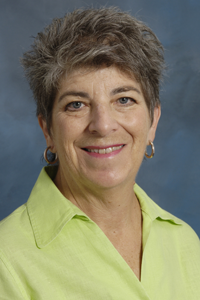For caregivers of Alzheimer’s, dementia patients, Jan Merling is on call
June 7, 2010

Jan Merling

Carol Cornman
With a year-long waiting list for her services, Jan Merling of the Office for the Study of Aging (OSA) is a most sought-after educator at the Arnold School of Public Health.
Over the past 10 years, Merling has visited some 350 locations across South Carolina and trained 13,000 people – that’s more people than live in Orangeburg – on the care of people diagnosed with Alzheimer’s disease and other less common forms of dementia.
“It kind of snowballed,” Merling said of Dementia Dialogues, the program she originally developed to train workers in skilled nursing facilities.
Dementia Dialogues was conceived as an on-the-job site program, consisting of five, 90-minute classes in the fundamentals of caring for dementia patients.
Given the nation’s aging Baby Boomer population and South Carolina’s popularity as a retirement location for seniors, OSA Director Carol Cornman said it’s unlikely that the demand for Merling’s services will diminish.
The South Carolina Alzheimer’s Disease Registry, which the OSA maintains, listed 60,763 individuals with Alzheimer’s disease and Related Disorders in 2006, the latest year for which there is complete data.
“That’s a very underestimated number because we know we can’t account for everyone,” she said.
The S.C. Alzheimer’s Association estimates the current number at about 80,000 individuals, supported by an estimated 159,221 family caregivers.
Merling said family caregivers are turning out in increasing numbers for the Dementia Dialogues classes. But they’re not the only ones wanting her services. She has carried the Dialogues message to other venues, including groups of social workers, speech therapists, adult day care centers, churches – even to a Kiwanis Club and law enforcement agencies.
If there is a common thread of wisdom through her class, it is that caregivers need to understand that with an Alzheimer’s patient, “it’s really not about what they do, it’s about what we do,” she said.
Put another way, Merling said caregivers should understand that “it’s perfectly OK” if a patient doesn’t want to eat or dress on someone else’s schedule.
Cornman credits the success of Dementia Dialogues to its practical, hands-on approach that helps caregivers understand that what is going on in the environment and in the minds of those individuals with dementia may influence their behavior.
Among Merling’s stops this month is Memory Matters at Hilton Head Island, where she is working with a group of 100 family and institutional caregivers. Memory Matters is a local non-profit organization that, among their many services, offers a day-care program for individuals with Alzheimer’s disease and support services for caregivers.
Beaufort County residents who organized Memory Matters say the need for dementia services is mushrooming in the area where the 65-85 age group is expected to nearly double 2025.
Cornman said the OSA also has embarked on a pair of studies of interest to the aging community and caregivers in particular:
- One study will address the factors that are involved in the decision-making process for placing a patient with dementia in a nursing facility.
- A second is a pilot program designed to train and support family caregivers of individuals with dementia. This study focuses on family members who are caring for loved ones at home.
For more information on the Arnold School’s Office for the Study of Aging, visit www.sph.sc.edu/osa. Call Jan Merling at 803-318-1601 for information on Dementia Dialogues.



_01.jpg)
_02.jpg)